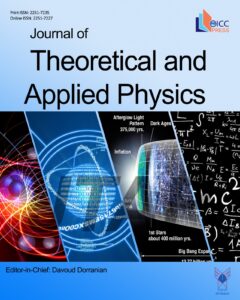Unsteady isothermal flow behind a magnetogasdynamic shock wave in a self-gravitating gas with exponentially varying density
Authors
Abstract
AbstractThe propagation of spherical (or cylindrical) shock wave in an ideal gas with or without gravitational effects in the presence of a constant azimuthal magnetic field is investigated. Non-similarity solutions are obtained for isothermal flow between the shock and the piston. The numerical solutions are obtained using the Runge–Kutta method of the fourth order. The density of the gas is assumed to be varying and obeying an exponential law. The shock wave moves with variable velocity, and the total energy of the wave is non-constant and varies with time. The effects of variation of the Alfven-Mach number, gravitational parameter and time are obtained. It is investigated that the presence of gravitational field reduces the effect of the magnetic field. Also, the presence of gravitational field increases the compressibility of the medium, due to which it is compressed and, therefore, the distance between the inner contact surface and the shock surface is reduced. The shock waves in conducting perfect gas can be important for description of shocks in supernova explosions, in the study of central part of star burst galaxies, nuclear explosion, rupture of a pressurized vessel and explosion in the ionosphere. Other potential applications of this study include analysis of data from exploding wire experiments and cylindrically symmetric hypersonic flow problems associated with meteors or re-entry vehicles etc. A comparison is made between the solutions in the cases of the gravitating and the non-gravitating medium with or without magnetic field. The obtained solutions are applicable for arbitrary values of time.



